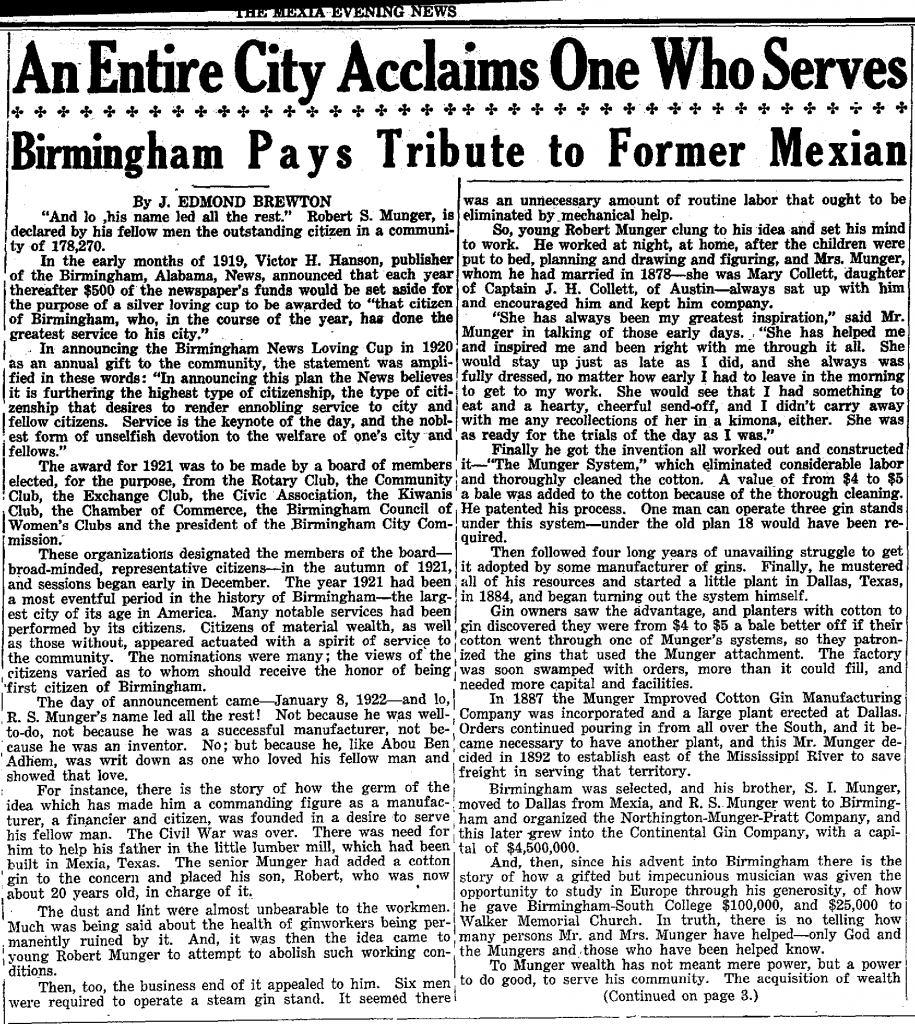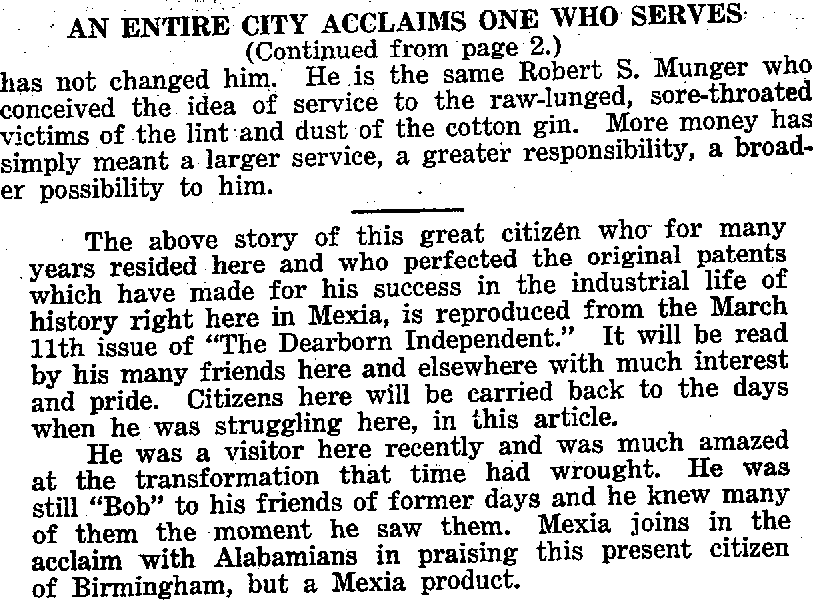The following article was published Friday, April 28, 1922, in the Mexia Evening News:

By J. EDMOND BREWTON
“And lo, his name led all the rest.” Robert S. Munger, is declared by his fellow men the outstanding citizen in a community of 178,270.
In the early months of 1919, Victor H. Hanson, publisher of the Birmingham, Alabama, News, announced that each year thereafter $500 of the newspaper’s funds would be set aside for the purpose of a silver loving cup to be awarded to “that citizen of Birmingham, who, in the course of the year, has done the greatest service to his city.”
In announcing the Birmingham News Loving Cup in 1920 as an annual gift to the community, the statement was amplified in these words: “In announcing this plan the News believes it is furthering the highest type of citizenship, the type of citizenship that desires to render ennobling service to city and fellow citizens. Service is the keynote of the day, and the noblest form of unselfish devotion to the welfare of one’s city and fellows.”
The award for 1921 was to be made by a board of members elected, for the purpose, from the Rotary Club, the Community Club, the Exchange Club, the Civic Association, the Kiwanis Club, the Chamber of Commerce, the Birmingham Council of Women’s Clubs and the president of the Birmingham City Commission.
These organizations designated the members of the board—broad-minded, representative citizens—in the autumn of 1921, and sessions began early in December. The year 1921 had been a most eventful period in the history of Birmingham—the largest city of its age in America. Many notable services had been performed by its citizens. Citizens of material wealth, as well as those without, appeared actuated with a spirit of service to the community. The nominations were many; the views of the citizens varied as to whom should receive the honor of being first citizen of Birmingham.
The day of announcement came—January 8, 1922—and lo, R. S. Munger’s name led all the rest! Not because he was well-to-do, not because he was a successful manufacturer, not because he was an inventor. No; but because he, like Abou Ben Adhem, was writ down as one who loved his fellow man and showed that love.
For instance, there is the story of how the germ of the idea which has made him a commanding figure as a manufacturer, a financier and citizen, was founded in a desire to serve his fellow man. The Civil War was over. There was need for him to help his father in the little lumber mill, which had been built in Mexia, Texas. The senior Munger had added a cotton gin to the concern and placed his son, Robert, who was now about 20 years old, in charge of it.
The dust and lint were almost unbearable to the workmen. Much was being said about the health of ginworkers being permanently ruined by it. And, it was then the idea came to young Robert Munger to attempt to abolish such working conditions.
Then, too, the business end of it appealed to him. Six men were required to operate a steam gin stand. It seemed there was an unnecessary amount of routine labor that ought to be eliminated by mechanical help.
So, young Robert Munger clung to his idea and set his mind to work. He worked at night, at home, after the children were put to bed, planning and drawing and figuring, and Mrs. Munger, whom he had married in 1878—she was Mary Collett, daughter of Captain J. H. Collett, of Austin—always sat up with him and encouraged him and kept him company.
“She has always been my greatest inspiration,” said Mr. Munger in talking of those early days. “She has helped me and inspired me and been right with me through it all. She would stay up just as late as I did, and she always was fully dressed, no matter how early I had to leave in the morning to get to my work. She would see that I had something to eat and a hearty, cheerful send-off, and I didn’t carry away with me any recollections of her in a kimona, either. She was ready for the trials of the day as I was.”
Finally he got the invention all worked out and constructed it—“The Munger System,” which eliminated considerable labor and thoroughly cleaned the cotton. A value of from $4 to $5 a bale was added to the cotton because of the thorough cleaning. He patented his process. One man can operate three gin stands under this system—under the old plan 18 would have been required.
Then followed four long years of unavailing struggle to get it adopted by some manufacturer of gins. Finally, he mustered all of his resources and started a little plant in Dallas, Texas, in 1884, and began turning out the system himself.
Gin owners saw the advantage, and planters with cotton to gin discovered they were from $4 to $5 a bale better off if their cotton went through one of Munger’s systems, so they patronized the gins that used the Munger attachment. The factory was soon swamped with orders, more than it could fill, and needed more capital and facilities.
In 1887 the Munger Improved Cotton Gin Manufacturing Company was incorporated and a large plant erected at Dallas. Orders continued pouring in from all over the South, and it became necessary to have another plant, and this Mr. Munger decided in 1892 to establish east of the Mississippi River to save freight in serving that territory.
Birmingham was selected, and his brother, S. I. Munger, moved to Dallas from Mexia, and R. S. Munger went to Birmingham and organized the Northington-Munger-Pratt Company, and this later grew into the Continental Gin Company, with a capital of $4,500,000.
And, then, since his advent into Birmingham there is the story of how a gifted but impecunious musician was given the opportunity to study in Europe through his generosity, of how he gave Birmingham-South College $100,000, and $25,000 to Walker Memorial Church. In truth, there is no telling how Mr. and Mrs. Munger have helped—only God and the Mungers and those who have been helped know.
To Munger wealth has not meant mere power, but a power to do good, to serve his community. The acquisition of wealth has not changed him. He is the same Robert S. Munger who conceived the idea of service to the raw-lunged, sore-throated victims of the lint and dust of the cotton gin. More money has simply meant a larger service, a greater responsibility, a broader possibility to him.
___________
The above story of this great citizen who for many years resided here and who perfected the original patents which have made for his success in the industrial life of history right here in Mexia, is reproduced from the March 11th issue of ‘‘The Dearborn Independent.” It will be read by his many friends here and elsewhere with much interest and pride. Citizens here will be carried back to the days when he was struggling here, in this article.
He was a visitor here recently and was much amazed at the transformation that time had wrought. He was still “Bob” to his friends of former days and he knew many of them the moment he saw them. Mexia joins in the acclaim with Alabamians in praising this present citizen of Birmingham, but a Mexia product.

